|
NIH global health research newsletter, with a focus on Global Environmental and Occupational Health (GEOHealth) hubs, and articles on the Human Frontier Science Program (HFSP) and how academia can benefit from global health.

|
|
May / June 2019 |
|
"Global Health in a Changing World"
Wednesday, June 19, 2019, 2 pm EDT
|
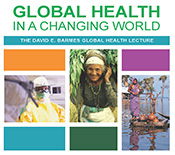
|
|
Scientific leaders, policymakers, advocates and grantees gathered to celebrate accomplishments achieved by the Human Frontier Science Program (HFSP) together with its partners, including the NIH.
|
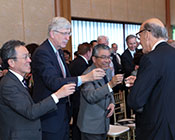 |
|
Fogarty Director Dr. Roger I. Glass discusses how there are many potential benefits for academic health centers to engage in global health.
|
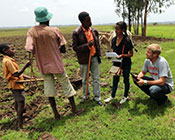 |
|
Dr. Eric Coker trained local health workers and used the data they gathered to improve understanding of the complex interplay between indoor air quality and poor respiratory health in Ugandan children.
|
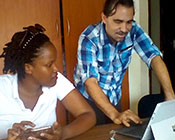 |
|
Global Environmental and Occupational Health (GEOHealth) hubs, supported by Fogarty and its partners, are helping to develop a critical mass of scientists in low- and middle-income countries who understand how the environment triggers disease, identify effective interventions and spur policy changes to improve health.
Each of the seven networked science hubs addresses high-priority health threats in their respective regions, including outdoor and household air pollution, pesticide exposures, environmental contamination, climate change and electronic waste.
|
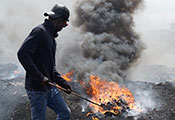
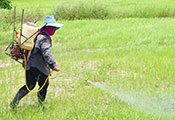
|
|
Also in this issue
$17M awarded by Fogarty and NIH partners to train HIV researchers, reduce stigma in developing countries
Fogarty has awarded $17 million through two programs to help train HIV researchers in low- and middle-income countries across the globe, and to drive the development of innovative interventions to reduce stigma for people living with HIV/AIDS. NIAID begins human trials of universal flu vaccine candidate
The first clinical trial recently began for an innovative universal influenza vaccine candidate developed by scientists at the NIH’s National Institute of Allergy and Infectious Diseases. Diseases cost Africa $2.4 trillion per year, WHO reports
A WHO study shows that nearly 630 million years of healthy life are lost each year in Africa due to disease, taking an economic toll of more than 2.4 trillion international dollars. NIH ClinRegs database provides international clinical trial regulations
NIH has expanded ClinRegs, its free, online database of international clinical trial regulations to include information from 20 countries, with real-time email updates of regulatory changes.
People in the news:
- David Malpass selected as new World Bank president
- Fogarty grantees Drs. Gagandeep Kang and Salim Abdool Karim named Royal Society Fellows
- Human Genome Organization recognizes Dr. Christian Happi
- Former IOM President Dr. David Hamburg has died
- Dr. Carol Baker honored as immunization champion
- Leading geneticist Dr. Muntaser Ibrahim freed from prison
- Details: People in the news
Global health briefs:
- WHO reports on gender bias in global health
- Path determined for AI in medical imaging
- CSIS examines global nutrition
- New tool helps with manuscript formatting
- Big data website facilitates collaboration
- Some global health grads struggle for jobs
- Details: Global health briefs
E-news extras
- News and publications featuring Fogarty staff
- It’s time to stop murder by counterfeit medicine by Dr Joel Breman, Fogarty senior scientific adviser emeritus
STAT, May 7, 2019
- The HIV response and global health, co-authored by Drs. Roger I. Glass, Wafaa El-Sadr, Eric Goosby and Linda E. Kupfer
The Lancet, April 27, 2019
- Population-level mathematical modeling of antimicrobial resistance: a systematic review [Open access], co-authored by Fogarty scientists
BMC Medicine, April 24, 2019
- Fogarty and NIH grantee news
- NIH global health research news
- Family, community bonds help decrease mental health problems of former child soldiers
NIH-funded study documents transition to adulthood of Sierra Leone’s child soldiers
NICHD/NIH news, June 18, 2019
- New fellowships bring African scientists to train at NIH
NIH Record, June 14, 2019
- NIH HIV experts prioritize research to achieve sustained ART-free HIV remission
NIAID/NIH news, June 6, 2019
- NIDA Humphrey Fellow Alexandra Hill named Chancellor of El Salvador
NIDA/NIH news, June 5, 2019
- NIEHS postdoctoral fellow examines interactions between environmental and social exposures in Nigeria
NIEHS/NIH Global Environmental Health Newsletter, June 2019
- REPRIEVE: A large trial for a growing problem among people with HIV
NIAID Now blog, May 29, 2019
- Human antibody reveals hidden vulnerability in influenza virus
Discovery by NIAID-funded researchers could aid quest for universal flu vaccine
NIAID/NIH news, May 16, 2019
- ESSENCE on Health Research proposes mechanism for review of investments in research capacity strengthening in LMICs (Fogarty is a member)
TDR news, May 2019
- African Postdoctoral Training Initiative fellow looks forward to collaborating within NCI
NCI Center for Cancer Research/NIH news, April 18, 2019
- In rare cases, immune system fails despite HIV suppression
NIH scientists identify paradoxical response to HIV medication in five individuals
NIAID/NIH news, April 18, 2019
- Novel antibody may suppress HIV for up to four months
NIH researchers, international collaborators report results of small, open-label study
NIAID/NIH news, April 17, 2019
- Global Alliance for Chronic Diseases (GACD) 2018-19 Annual Report (NIH is a GACD member)
GACD news, April 15, 2019
- Other global health research news
- More global health research news from Fogarty
|
Funding opportunities
Late-Stage Implementation Research Addressing Hypertension in Low- and Middle-Income Countries: Scaling Up Proven-Effective Interventions from NHBLI and NINDS
Application deadline: July 8, 2019
Global Infectious Disease Research Training Program
Application deadline: July 25, 2019 U.S.-South Africa Program for Collaborative Biomedical Research Phase 2
HIV/AIDS (R01 Clinical Trial Optional) (RFA-AI-19-022) and (U01 Clinical Trial Optional) (RFA-AI-19-023)
Infectious Diseases (R01 Clinical Trial Optional) (RFA-AI-19-024) and (U01 Clinical Trial Optional) (RFA-AI-19-025)
Application deadline: July 26, 2019 HIV Research Training Program
Application deadline: August 20, 2019 Global Brain and Nervous System Disorders Research Across the Lifespan
Application deadline: November 7, 2019 Emerging Global Leader Award
Application deadline: November 7, 2019 Chronic, Noncommunicable Diseases and Disorders Research Training
Application deadline: November 12, 2019 Ecology and Evolution of Infectious Diseases (EEID)
Application deadline: November 20, 2019 Reminder: Grant applicants must follow updated NIH appendix policy
Fogarty news, updated June 2019 All Fogarty funding opportunities Subscribe to NIH global health funding opportunities email alerts
|
Upcoming events
-
June 19, 2019, 2 p.m. EDT
2019 Barmes Global Health Lecture
Global Health in a Changing World
by Dr. Jeremy Farrar, Director, Wellcome Trust
NIH campus
Bethesda, MD
The lecture will be webcast live by NIH Videocasting.
July 14 - 18, 2019
Alzheimer’s Association International Conference
Los Angeles, CA July 21 - 24, 2019
IAS Conference on HIV Science
Mexico City, Mexico August 5 - 9, 2019
AFREhealth Annual Symposium
Lagos, Nigeria September 5 - 6, 2019
Fogarty Advisory Board Meeting
NIH campus
Bethesda, MD Fogarty calendar of events
Connect with Fogarty
 Fogarty on Facebook | Fogarty on Facebook |  Fogarty on Twitter | Fogarty on Twitter |  Subscribe Subscribe
|
|
Global Health Matters is produced by the Office of Communications at the National Institutes of Health's Fogarty International Center. For more information, please contact managing editor Ann Puderbaugh, at ann.puderbaugh@nih.gov or 301-496-2075.
Permission to reprint Global Health Matters content: All text produced in this newsletter is in the public domain and may be reprinted. Please credit Fogarty International Center. Images must be cleared for use with the individual sources, as indicated.
The Fogarty International Center, the international component of the U.S. National Institutes of Health, addresses global health challenges through innovative and collaborative research and training programs and supports and advances the NIH mission through international partnerships.
Subscribe, update your subscription or unsubscribe to this e-newsletter from the Fogarty International Center subscription page. We encourage you to forward this e-newsletter to colleagues who may find it of interest. |
|






